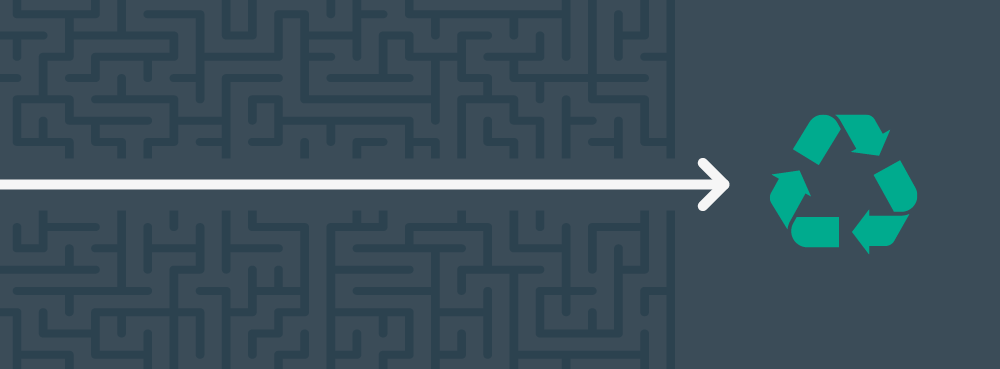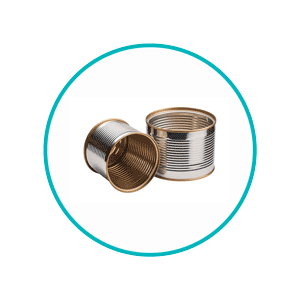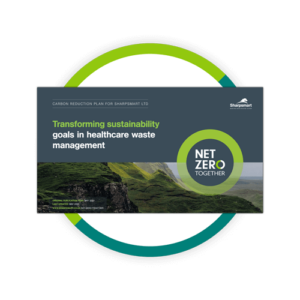Simpler Recycling Legislation – Does It Affect Healthcare?

Simpler Recycling. Is it legislation or a promise? It’s both. It’s a promise from the UK Government, introduced as new legislation to simplify recycling for businesses. This includes healthcare facilities.
This blog will help you understand the timelines and key requirements to ensure your facility is compliant with regulations and ready to improve recycling rates and reduce plastic pollution.
TOPICS WE WILL COVER:
- What Is Simpler Recycling?
- What’s the Timeline for Simpler Recycling?
- Are Healthcare Facilities Affected by Simpler Recycling Regulations?
- Which Waste Types Does Simpler Recycling Target?
- Understanding T.E.E.P (Technically, Environmentally or Economically Practicable)
- Simpler Recycling Tips for Healthcare Facilities
- Looking for Help with Simpler Recycling?
- What Are the Consequences for Non-Compliance?
- Sharpsmart: Your Total Waste Management Partner
What Is Simpler Recycling?
Simpler Recycling is a new initiative being launched by the Department for Environment, Food & Rural Affairs (DEFRA), to streamline recycling processes for businesses across England, including healthcare facilities.
This legislation seeks to enhance recycling rates and curtail plastic pollution by:
- Streamlining waste streams: Businesses are now obligated to separate dry recyclables (plastic, paper, card, glass, metal) from food waste and general waste. This clear segregation simplifies the recycling process and reduces contamination.
- Increasing consistency: Standardised collection and recycling procedures will be implemented across England. This uniform approach will minimise confusion and ensure consistent recycling practices nationwide.
The Simpler Recycling initiative will complement other crucial environmental measures, such as the Plastic Packaging Tax (PPT), Extended Producer Responsibility for Packaging (pEPR), and the Deposit Return Scheme (now law, scheduled to launch October 2027).
By effectively segregating waste at the source of production, the quality of recyclable materials will be improved, resulting in a higher quality of materials available to go back into product manufacture – this increases material availability for the required 30% of recycled plastic to avoid the Plastic Packaging Tax.
These collective efforts aim to minimise waste, stimulate the recycled plastic market, and focus on a more circular economy in the UK.
This increased focus on reducing plastic pollution is long overdue and more important than ever, especially when considering the environmental and health impacts of plastic in healthcare.
What’s the Timeline for Simpler Recycling?
Depending on size, businesses have specific deadlines to comply with the Simpler Recycling regulations:
- March 31, 2025: This is the deadline for all businesses with 10 or more Full Time Equivalent (FTE) employees to implement the necessary waste segregation systems and adhere to Simpler Recycling regulations.
- March 31, 2027: This is the deadline for smaller businesses with fewer than 10 FTEs.
Important Note:
The Plastic Packaging Tax (PPT) is already in place as an ongoing tax for businesses that manufacture or import plastic packaging containing less than 30% recycled plastic content.
Are Healthcare Facilities Affected by Simpler Recycling Regulations?
Yes. As of March 31st 2025, all businesses, including healthcare facilities with 10 or more FTEs are mandated to separate plastic, paper and card, glass, metals (cans, tins, foil, etc.), and food waste from general waste.
This crucial step significantly impacts the diversion of valuable resources from incineration and landfills and contributes to a more sustainable future.
Which specific healthcare facilities are affected?
- Hospitals and Trusts
- GP Surgeries
- Dental Clinics
- Nursing and Care Homes
- Cancer Centres
- Pharmacies and Chemists
- Aesthetics Clinics and Med Spas
- Veterinary Clinics
- Retail and Other Businesses
Don’t see your facility type listed above? You’ll still be affected by Simpler Recycling.
Which Waste Types Does Simpler Recycling Target?
Simpler Recycling focuses on the following key waste streams:
Glass
- Bottles (all colours)
- Rinsed empty jars (all colours)
Plastic
- Bottles (PET, HDPE, etc.) check with your waste service provider for the specific plastics accepted
- Rinsed empty food containers and trays
Metal
- Empty drinks cans
- Rinsed empty food tins
- Empty aerosols
- Aluminium foil, food trays and tubes
Paper and Cardboard
- All paper and cardboard, except:
- Paper and card containing glitter or foil
- Laminated paper
- Stickers and sticky paper
- Padded lined envelopes
- Paperback and hardback books
- Wallpaper
*Food Waste
- Any expired food or leftovers
- Food waste from processing or preparation of food (e.g. bones, eggshells, fruit and vegetable skins, tea bags, coffee grounds)
*All businesses produce some food waste and as the Government hasn’t set a minimum food waste weight before the new legislation applied, it’s likely that this guidance will be relevant to your workplace.
Understanding T.E.E.P (Technically, Environmentally or Economically Practicable)
With the healthcare industry being formed of organisations and Trusts that encompass both large acute facilities and smaller community-based satellite sites, it’s important to determine whether separate waste collection is feasible on a case-by-case basis.
It’ll be the responsibility of your waste service provider to conduct a T.E.E.P assessment as part of your waste auditing process to evaluate if separate collection is:
- Technically viable given your facility’s infrastructure and operational constraints.
- Environmentally viable to provide better environmental outcomes than mixed waste streams
- Economically viable when compared to the environmental benefits.
Simpler Recycling Tips for Healthcare Facilities
As with any new legislation, the thought of maintaining compliance can be a little daunting, and you may be concerned about how you’re going to do it.
Here are some tips for ensuring you comply with Simpler Recycling:
Segregate Waste Effectively
By implementing clear and well-defined systems for separating dry recyclables, providing appropriate bins – preferably colour-coded – and clear signage, you’ll be on track for facilitating easy and accurate waste segregation with minimal behavioural change needed.
Choose the Right Waste Partner
Selecting the right waste partner that can handle all of your required waste streams efficiently is vital. Ensure your chosen collector has the necessary licenses and permits to collect and process your waste and don’t hesitate to investigate their environmental credentials.
Bonus points if they have a snazzy carbon reduction plan that backs up their claims with data!
Ensure Proper Waste Management
Ensure you have robust procedures in place for waste handling, storage and collection and minimise the risks of contamination by keeping waste streams separate throughout the process.
Provide Comprehensive Staff Training
Conduct thorough, in-depth training sessions for all healthcare staff to cover the new waste segregation and recycling procedures. Back this up with educational materials, ongoing support and refresher training as needed.
Review and Update Procedures
Monitor waste streams for contamination and non-conformances and regularly review and adjust your recycling procedures accordingly. It’s also important to stay informed about any changes and updates to regulations and best practices.
Looking for Help with Simpler Recycling?
Sharpsmart can help! Whilst we’re known for specialising in healthcare waste management, we can assist you with any type of waste generated within the healthcare setting, including those impacted by the Simpler Recycling legislation.
We go beyond traditional waste collection. We’re known throughout the UK for our ‘Four Walls’ approach to waste management, which provides comprehensive support, including:
- Waste audits: To assess your current waste generation and identify areas for improvement.
- Waste stream analysis: To identify and segregate recyclable materials from your other waste streams.
- Compliance consultation: To guide you in meeting the requirements of all healthcare waste regulations, including the Health Technical Memorandum (HTM) 07-01.
- Staff training: To educate your staff on the new recycling procedures and best practices.
- Educational materials: To provide clear and concise information for your staff and visitors.
- Industry-leading waste containment solutions: To ensure the safe and secure storage of different waste streams.
We can provide containment solutions, signage and services for all healthcare waste streams and help you capture all of the waste data you need to set and achieve bespoke KPIs on your route to Net Zero.
Get in touch to learn more about what partnering with us can do for you.
What Are the Consequences for Non-Compliance?
After reading all of this, you might be thinking something along the lines of ‘Oh, great, more waste segregation. I don’t have enough time as it is!’ You wouldn’t be alone in that thought, but outside of the knowledge that every item correctly segregated has a positive environmental impact, here are some more incentives to get on board.
Compliance Notices
The Environment Agency has the authority to issue compliance notices to facilities that are not meeting their recycling obligations. These notices may outline specific steps that need to be taken to rectify the situation.
Enforcement Action
If your facility fails to comply with legislation, further enforcement action may be taken in the form of fines or in some cases, legal action and prosecution.
Sharpsmart: Your Total Waste Management Partner
With safety, security and compliance underpinning our cradle-to-grave total waste management processes, Sharpsmart’s waste handling, transport and treatment expertise helps healthcare facilities manage all clinical and domestic wastestreams.
Partnering with experienced providers like Sharpsmart UK ensures that all of your healthcare waste is handled safely, sustainably, and in compliance with all relevant regulations. As the UK healthcare sector continues to grow and evolve, so too will our strategies for managing healthcare waste, driving towards a safer and more sustainable future.
Contact us today for a free consultation and empower your facility with industry-leading total waste services.
Let's Talk!
Your time is valuable, and we don’t want to play hard to get. You can either phone us directly on the details listed on our contact page, or feel free to fill out this short form and one of our team members will get back to you as quickly as possible.
